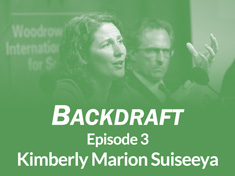-
Backdraft Episode #3: Kimberly Marion Suiseeya on Voice, Justice, and Representation
February 24, 2017 By Lauren Herzer Risi “If we think sustainable development is the goal we want to achieve, we have to be radical in elevating those who have been traditionally excluded,” says Northwestern University’s Kimberly Marion Suiseeya in this week’s “Backdraft” episode. “We have to approach conservation and global environmental governance from the perspective of the invisible and the marginalized people.”
“If we think sustainable development is the goal we want to achieve, we have to be radical in elevating those who have been traditionally excluded,” says Northwestern University’s Kimberly Marion Suiseeya in this week’s “Backdraft” episode. “We have to approach conservation and global environmental governance from the perspective of the invisible and the marginalized people.”“If we think sustainable development is the goal we want to achieve, we have to be radical in elevating those who have been traditionally excluded,” says Northwestern University’s Kimberly Marion Suiseeya in this week’s “Backdraft” episode. “We have to approach conservation and global environmental governance from the perspective of the invisible and the marginalized people.”
Climate interventions are often developed and implemented from the international perspective first and foremost, leading to unanticipated consequences for affected communities. Interventions like REDD+ (Reducing Emissions from Deforestation and Forest Degradation) can alter informal land use practices and undermine traditional forms of conflict resolution.
Suiseeya saw this firsthand with a cluster of villages in the Kiet Ngong wetland of southern Laos. When efforts to delineate land use and boundaries were introduced by development agencies ostensibly to improve conservation, they inadvertently caused conflict by assigning most of the previously collectively managed wetland and its resources to one village.
“If you’re not understanding how people manage a resource, who gets privileged through these processes, who gets marginalized, you really have the potential of backdraft and conflict and that’s a much longer-term development problem that you’ve just exacerbated,” says Suiseeya.
To do this this requires more listening and less prescribing by intervening parties, whether they are a national government, international development actor, or NGO. Interventions developed without an understanding of the needs and wants of the affected people run the risk of, at a minimum, failing, or worse, causing conflict.
Suiseeya recommends taking steps to understand how projects “either reify or shift the power dynamics in communities.” Different ways of living and understanding the world affect how natural resources are managed, she says. Intervening actors must understand this and build it into their project, or risk poor outcomes. You get there through a justice lens, she says, and by thinking about who is at the table and who is not.
“Decolonizing methodologies” encourage the researcher or practitioner to meet people where they are and understand the ways that a community may or may not want to be engaged. This can lead to better buy-in from the community, the empowerment of local leaders, and better conservation results in the long term.
All of these approaches require better listening. “If we’re not paying attention to that voice component, we’re actually seeing some disempowerment,” says Suiseeya. “It’s a question of how can we use our projects to put people in the driver’s seat of their own futures.”
One good sign: In September of last year, the International Union for Conservation of Nature, the world’s largest environmental network, added a new membership category for indigenous peoples’ organizations. “The vote to allow indigenous people to represent themselves through their own organizations is a huge change that we would not have seen 5 or 10 years ago,” Suiseeya says.
The “Backdraft” podcast series is hosted and co-produced by Lauren Herzer Risi and Sean Peoples, a freelance multimedia producer based in Washington, DC.
Friday Podcasts are also available for download on iTunes and Google Podcasts.
 A Publication of the Stimson Center.
A Publication of the Stimson Center.

 “If we think sustainable development is the goal we want to achieve, we have to be radical in elevating those who have been traditionally excluded,” says Northwestern University’s Kimberly Marion Suiseeya in this week’s “Backdraft” episode. “We have to approach conservation and global environmental governance from the perspective of the invisible and the marginalized people.”
“If we think sustainable development is the goal we want to achieve, we have to be radical in elevating those who have been traditionally excluded,” says Northwestern University’s Kimberly Marion Suiseeya in this week’s “Backdraft” episode. “We have to approach conservation and global environmental governance from the perspective of the invisible and the marginalized people.”

